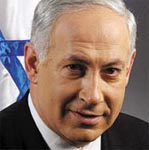Benjamin Netanyahu - Silver-tongued hawk ahead in polls
 Tel Aviv - Few people feel neutral about Israeli prime ministerial hopeful and Likud Party leader Benjamin Netanyahu.
Tel Aviv - Few people feel neutral about Israeli prime ministerial hopeful and Likud Party leader Benjamin Netanyahu.
His enemies accuse him of being untrustworthy, duplicitous, devious, unscrupulous and of having been an incompetent premier during his 1996 to 1999 tenure.
They point to the fact that while he began his tenure in the prime minister's office with comparisons to John F Kennedy (mainly because of his young age), he ended it abandoned by coalition allies and castigated by just about everyone else.
His supporters, on the other hand, regard him as intelligent, professional and highly proficient, able to defend Israel's interests in a hostile, even anti-Semitic, world.
They point out that his tough approach to peace-making during his premiership ended the spate of suicide bombings by Palestinian militants against Israelis, and lowered Palestinian expectations in the peace process.
Even during his brief timeout from politics following his premiership, and then his return to the cabinet of then-premier Ariel Sharon, Netanyahu remained a vocal and hardline critic of Israeli peace moves, resigning from the government to protest Sharon's plan to unilaterally withdraw Israeli troops and settlers from the Gaza Strip.
He took over the Likud when Sharon bolted to form the centrist Kadima faction, and although the Likud scored its lowest-ever Knesset representation in the 2006 elections, it is now - according to the polls at least - positioned to return to power.
The renaissance is due in no small part to the perception that Netanyahu was right when he warned that unilateral Israeli withdrawals from south Lebanon and the Gaza Strip would enable those territories to serve as springboards for attacks on Israel.
Netanyahu has been particularly vocal on the subject of the Islamist Hamas movement which controls the Gaza Strip, telling an audience at a conference near Tel Aviv that if Israel wanted to remove the missiles militants fire regularly from the salient, "we have no choice but to remove the regime in Gaza."
At the same time, while campaigning for premier, Netanyahu has moderated somewhat his formerly maximalist approach to the peace process, saying he will continue searching for a political solution to the conflict, but adding the rider that that any such solution has to be accompanied by the economic development of the Palestinian territories and the strengthening of the moderates in the Palestinian Authority.
He has also sworn not to relinquish Israeli control over East Jerusalem which Palestinians want as the capital of their future state.
When he won his extremely narrow victory in the 1996 prime ministerial race, the articulate Netanyahu was seen as representing something different, almost unique, in Israeli politics, and not just because he was the first prime minister to have been born after the creation of the state.
American-oriented, he gave off an appearance of slick professionalism, unlike the dour, colourless Israeli politicians of previous generations.
Born on October 21, 1949 in an affluent suburb of Jerusalem, the son a respected academic, he served as an officer in an elite Israeli army commando unit, like his elder brother Jonathan, who became a national hero when was killed in the daring Israeli rescue of hijacked hostages at Entebbe, Uganda, on the night of July 3-4, 1976.
He was educated in the United States and graduated from the Massachusetts Institute of Technology, with a masters in business management.
Plucked from obscurity in the early 1980s when he was working as a marketing manager at a Jerusalem furniture company, to become information attache at the Israeli embassy in Washington, he was soon appointed Israeli ambassador to the United Nations.
There his media skills and fluent speaking style - which awe even his critics even if not convincing them - ensured he became a star not only on US television, but among the Israeli public.
He had no trouble getting elected to parliament for the Likud Party in 1988, and served as deputy foreign minister and then a deputy minister in the Prime Minister's office.
When the Likud lost the 1992 elections, Netanyahu was instrumental in instituting American-style primaries to determine the next party leader, and to no-one's surprise won handsomely.
He is married and has three children. (dpa)